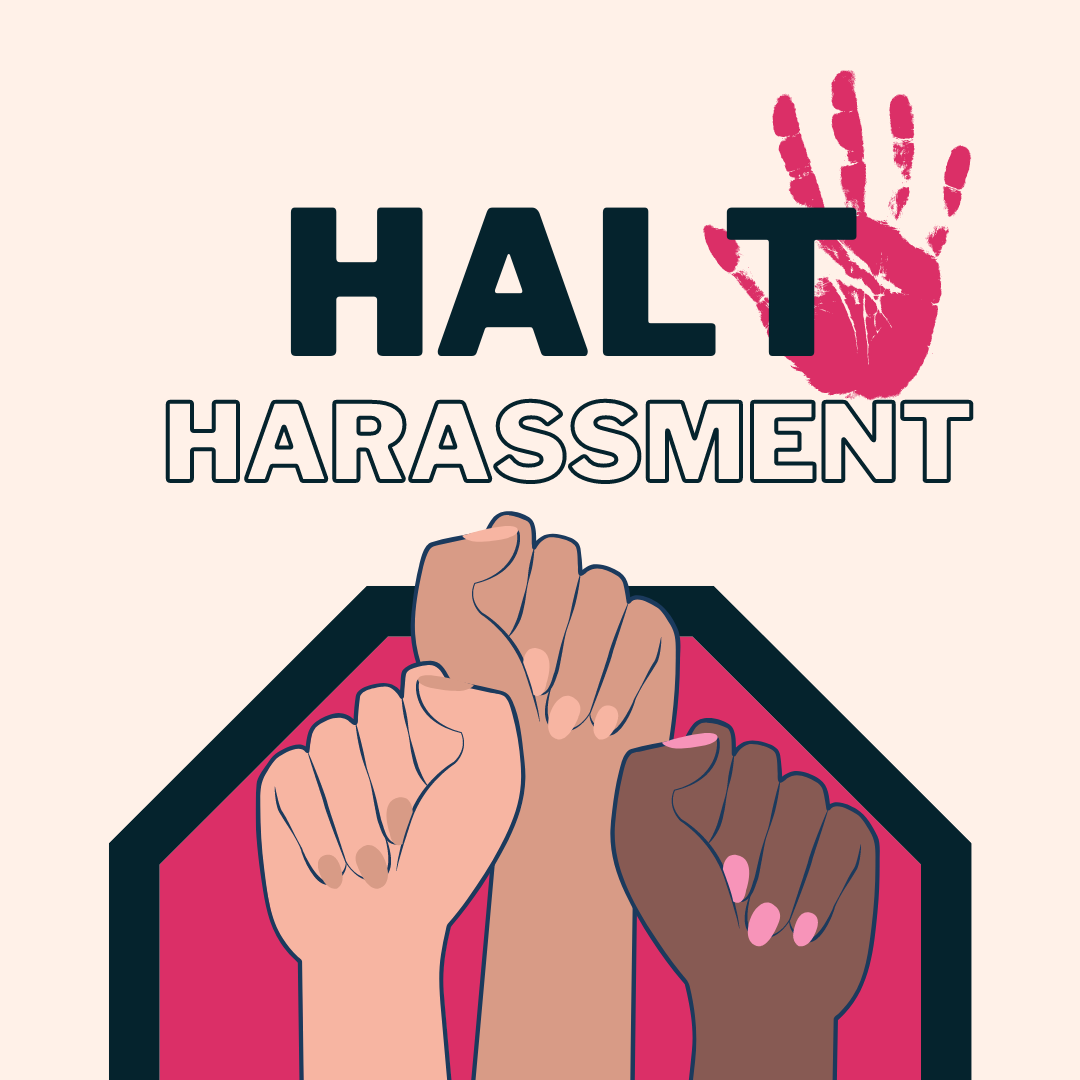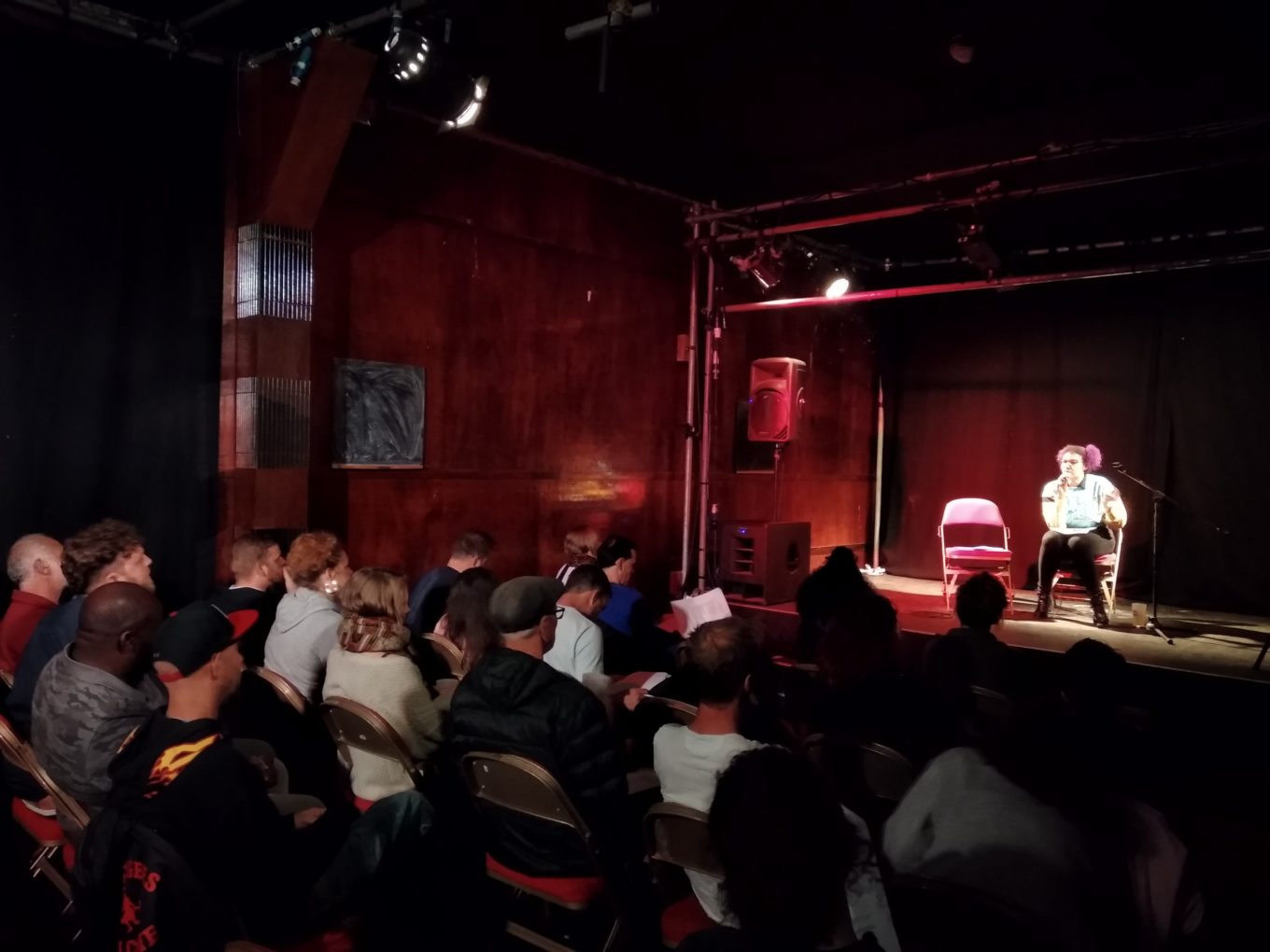Halt Harassment


It should not take a case of extreme violence for us to see that male violence permeates throughout our society – in our Government, our police, our workplaces, our nights out, and our individual actions. Throughout all these levels we need to make changes, so that no one feels the threat or result of male violence. Our responsibility as an organisation running venues and events, is to lead that change in those spaces and influence a wider change in the arts and culture sector. Our responsibility as men, whatever we’re doing, is to engage fully in change and create a society that doesn’t just respond to male violence, but stops it from happening at all.
Anthony Elliot, Artspace Lifespace Trustee
More than Vigilance is Required
In response to recent events, Project Vigilant has been announced, where undercover police will be sent to clubs, bars and popular nightspots to relay intelligence about predatory or suspicious offenders to uniformed officers. Women have been asked to be vigilant for years. I think it is time for men to be the vigilant ones, examining internalised expected masculine standards that makes some men engage in toxic behaviours such as sexual harassment. Intimidation does not just happen in nightclubs and is not a problem experienced solely by women. Street harassment is a daily occurrence for many marginalised groups (women, girls, LGBTQIA+ people, Black and people of colour). Women’s rights charity survey data shows that Covid-19 has seen women experience an upsurge in online sexual harassment whilst working from home, as harassers take advantage of online work platforms and social media during the pandemic. One in five LGBTQ people have experienced a hate crime or incident because of their sexual orientation and/or gender identity in the last 12 months, two in five trans people have experienced a hate crime or incident because of their gender identity in the last 12 months, Reports of violent disability continue to rise. Avon & Somerset police recorded a 20% increase in the number of racially-motivated hate crimes in October 2020.
It is time we looked at halting the problem, rather than just being vigilant and waiting for crimes to happen.
The Halt Harassment Campaign
In 2017 Artspace Lifespace, alongside sister company Invisible Circus, received funding from Bristol City Council Imagination Fund to develop a strategy to make our spaces more inclusive. We embarked on The Art Of Inclusion. Two years later Ngaio Aniya, with the support of a volunteer Inclusion Team, launched the halt harassment campaign – a campaign emphasising that harassment is a societal problem that needs a citywide framework in place to tackle exclusionary behaviour.
In Feb 2020 The Inclusion Team shared the draft of the Halt Harassment framework to standardise how incidents are dealt with. Te process when a complaint is made is clear, consistent across venues, and ensures that everyone is heard and safe. To be effective, a shared framework such as this will need to be implemented through promoters, venues and artists (as well as other spaces such as universities and workplaces). It also needs to take into account what happens when alcohol/drugs are involved and inhibitions are lowered as a result.
The Halt Harassment code
Harassment is behaviour directed at an individual that is unwanted or unwelcome and causes substantial distress in that person.
Halt Harassment has a zero tolerance policy with respect to personal /sexual harassment, and all such harassment is strictly prohibited in this venue.
- Personal harassment means any conduct whether verbal or physical that is discriminating in nature, based upon another person’s race, colour, ancestry, place of origin, political beliefs, religion, marital status, physical or mental disability, sex, age or sexual orientation.
- Sexual harassment is any conduct, comment, gesture or contact of a sexual nature that one would find to be unwanted or unwelcome by any individual.
How can we help?
In February 2020, using funding from the Arts Council England Cultural Recovery Fund, The Vestibules awarded six micro bursaries to six individuals who were core to the Halt Harassment campaign. The bursaries, part of our How Can I Help residency programme, were given in support of the continued development of the campaign. Each commission produces or refines a piece of work that contributes to the overall aims of the campaign. The Island Venue staff who have been trained through the brilliant Good Night Out campaign are also working on collating resources and interviews with groups across the city who share our vision for a zero-tolerance policy with respect to all harassment. We will be sharing this work from April 2021 and calling on businesses and venues across Bristol to sign up to the campaign.
How can YOU help?
The first step in helping? Listen. We know its not all men, but it is nearly all women. 97% of women aged 18-24 have been sexually harassed and 80% of women of all ages had experienced sexual harassment in public spaces. (Source Voice Mag UK). Most crimes are committed by men, but also most crimes (except for sexual assault) are committed against men. Across the UK, while 12 million Brits don’t believe toxic masculinity is a problem that exists in today’s society, 37% of men and 52% of women do believe that toxic masculinity is a big issue within present-day society. (Source Future Learn). Toxic masculinity does not mean ‘all men are toxic’ or ‘violent’. It refers to the culture that equates masculinity with physical power. A review paper published in Neuroscience and Biobehavioral reviews analysing 30 years worth of brain studies concluded that there is very little difference between the male and female brain. Invoking men’s biology to explain their behaviour too often ends up absolving their actions (Source Aeon.co). We need to stop absolving (some) men and the culture of ‘boys will be boys’. Instead, we should work towards ending the toxic culture that also harms men. Failure in meeting culturally-constituted expectations may be expressed through either physical dominance or aggression or inwardly through depression, addiction, or suicide. We need to treat the disease not just suppress the symptoms.
The next step – learn. Future Learn has a free online course you can study for 4 hours a week over 4 weeks: A Global History of Sex and Gender: Bodies and Power in the Modern World. Dr Michael Flood has shared the vital role men and boys can play in preventing and reducing men’s violence against women and girls with a collection of readings, speeches, discussions and his own book. Bristol 247 announced today that The Radical Resilience Project is launching The Emergency Men’s Learning Course which will take place over four weeks and be a non-judgemental and compassionate space for men to learn about male violence, sexism and rape and offering resources and learning tools. Have a look at the learning resources on Beyond the Hashtag or Cargo Classroom. Check out Stonewalls Best Practice, Toolkits and Resources.
Once you have unpicked some of the ideas that have been passed down through peer groups and family conditioning, the next step is being prepared to change. Equality is not a zero-sum game. Teach the men in your life that emotions are allowed and how to learn emotional resilience instead of ‘manning up.’ Be prepared to speak out and support others rather than keeping your head down. Women and men have had enough. We need change.
If you are a venue or business in Bristol and are interested in getting involved with the Halt Harassment Campaign then please email inclusion@artspacelifespace.com and let us know how you can help e.g. support with invigilation at physical exhibitions, marketing support, printing posters or organising a billboard campaign or supporting the project financially so we can pay for more resource to support this campaign.